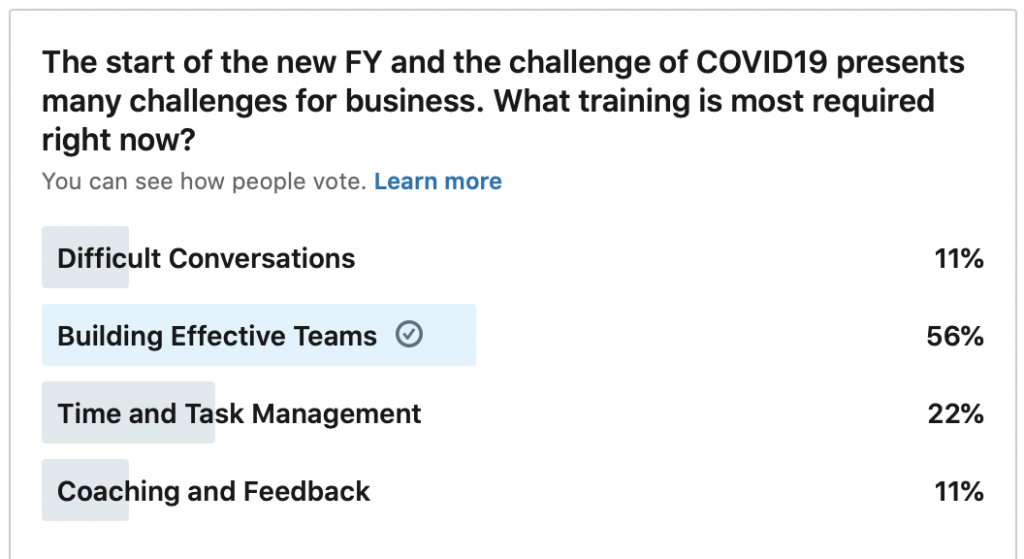We recently conducted a LinkedIn poll looking at the greatest training needs for business at present. Of the 4 options provided, 56% of those surveyed said that ‘building effective teams’ was most required right now.

This finding has been reinforced as we spoke to leaders in workshops and one-on-one coaching in recent weeks.
Quite simply, the changing circumstances that we face as leaders, team members and workers in organisations and small businesses has changed the way that we work, which has also changed the way that our teams behave.
Is it surprising that changes that effect us on an individual level have also an impact on our team behaviour? Consider the following areas that may have been impacted in the last 6 months:
- Work from home and changes to physical workspace
- Balancing work and school age children’s teaching at the same time
- Virtual meetings and gathering
- Lack of physical contact with co-workers
- Health of self, friends, family and co-workers
- Change in financial status
- Greater emotional highs and lows
- Different outlook on risk and security
- Changes in short- and long-term planning
- Product lines or offerings increasing or decreasing
There have been plenty of articles on the topics listed above (so I won’t expand further on them individually). Suffice to say, if the importance that you place on any other items listed above has shifted or changed in the last 6 months, chances are it has for your team members as well – and this changes the dynamics of your team.
Ie. if a team has greater health concerns and working from work seems like a greater risk – is it unreasonable to assume that the risk profile of the team may have changed in other areas as well? Will the team now be more risk averse?
To build and maintain the health of your team, a greater understanding of the impact / change in behaviour of your team members needs to be understood and adapted to. Team leaders, supervisors, managers, executives and small business owners need to be mindful that the behaviour of their team 6 months ago (both as individuals and a collective) will not be the same as it was – and may never go back to being that way.
A simple questions to ask of teams and team leaders is:
What will you now tolerate that you wouldn’t before (in regards to team behaviour)?
(For example, working from home has changed dress expectations, interruptions, children (and partners and animals) in the background of a Zoom call. Would this have been tolerated 6 months ago? What else do you now tolerate / accept / see as a norm?
What will you no longer tolerate from team behaviour?
Workshop participants and coaching client have mentioned changes in their tolerance to lateness, excuses, camera (on or off), interrupting each other.
The key part of this simple question / answer is not the responses (although they are useful). It is the rest of your team members knowing and understanding the differences in each others preferences, and providing an opportunity to adjust accordingly.
Are your team members flying blind to your new tolerances / intolerances? An effective team – and an effective team leader – is taking the time to learn and adjust behaviours for the efficiency, harmony, effectiveness and well-being of the team.
If Building Effective Teams is an important requirement in your team at the moment, consider attending our workshop ‘Building Effective Teams’ on 8 October 2020. A focussed workshop on building alignment within your team, adjusting for new environments and challenges, how to raise difficult discussion and creating a common understanding – all the while building trust and reducing conflict.
Our highly successful workshops ‘Building Effective Teams’ and ‘Leading High-Performing Teams’ can be conducted in-house at a time to suit you and your team. Reach out via the Contact Page or book a Discovery call to find out how IMLD can help build your effective team.



